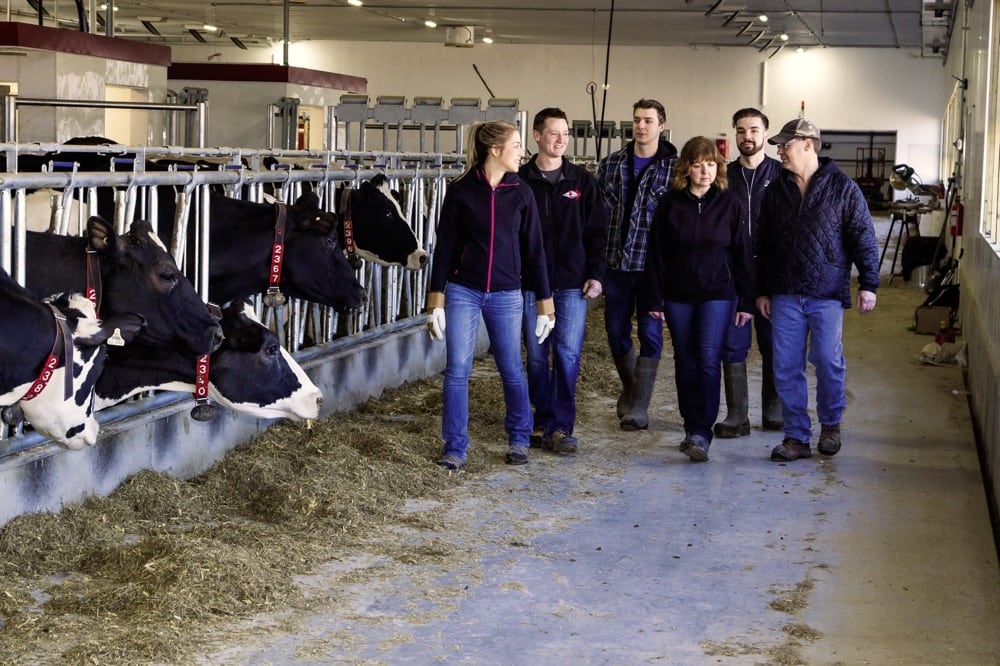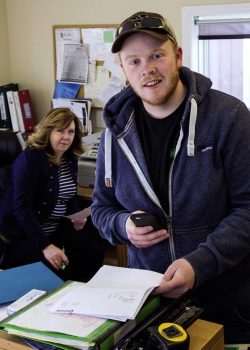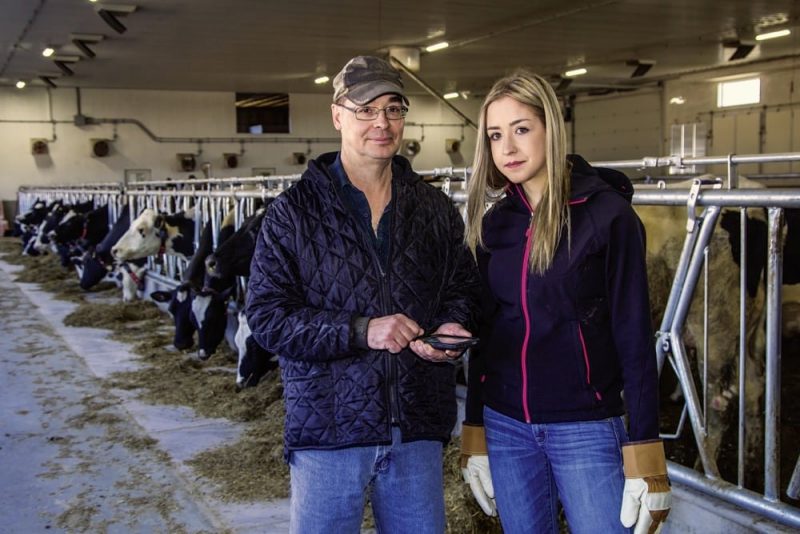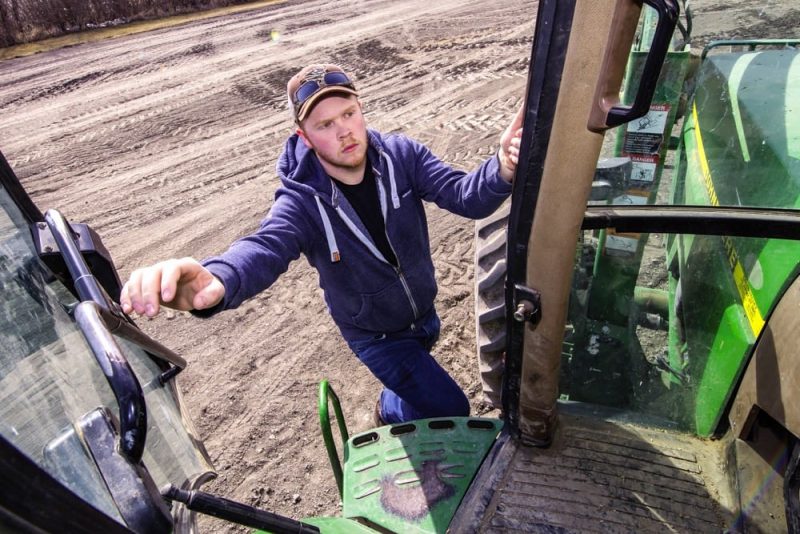
The Badiou family is well into the process of transitioning the family farm to the next generation. Photo: Sandy Black
Country Guide: Impressing Mom and Dad
There’s more reason than ever for farm kids to prove to Mom and Dad that they’ve got what it takes to be trusted with the farm.
As the Country Guide (May/June 2018) reports:
Transitioning the family farm to the next generation is never easy. But how much harder when the parents have their doubts whether their next generation has the skills or the personality to manage the operation?
On more and more farms, the wise thing would be for the kids to set out to prove to Mom and Dad that they’re actually capable of becoming top notch managers and owners.
But how do you do that if you don’t really know what your parents are looking for?
If you’re too “take-charge,” will your parents think you’re impatient and too much of a know-it-all to succeed? But if you sit back and wait for your parents to open every door, will they think you lack the drive that farming is going to take?
Besides, how do you prove that you’ve got what the job is going to take when no one is really sure what those skills are going to be?
It turns out, though, the kids (or at least a lot of them) are better than you might think at understanding this conundrum. Even better, they also understand from their parents’ point of view.
“It’s important for the retiring generation to know that their children will be competent managers,” agrees Lucette Badiou, herself the next generation on a fifth-generation farm an hour and a half west of Winnipeg. “Family farms are becoming more complex and there’s a lot more capital invested.”
Still, there are some core strategies that have got to be part of virtually any young person’s succession strategy. And again, a lot of young farmers recognize it.
“It’s important not to feel entitled,” Badiou says, “and to work harder and demonstrate my commitment to my parents.”
Jake Ayre is another young farmer working towards taking over the family farm, and he’s always known that he has to earn it. He accepts that nobody is just going to hand it to him.
Like Badiou, Ayre understands that he needs to instill the confidence in his parents, Heather and Andrew, that he is capable of taking over the farm and moving it forward to the next level.
So he’s glad he decided to enrol in the University of Manitoba’s agricultural diploma program because it has provided him with some valuable tools to do just that.
Show commitment
After graduating high school in 2014, Ayre went to university unsure about his future career path. He was toying with the idea of something in agriculture, business or communications, but had no clear idea which way to go.
After speaking with students taking the agricultural diploma program, he decided it sounded like something he’d enjoy, and he ended up graduating from the program in 2017.
A huge influence on his decision to return to the family farm near Minto, about 25 minutes south of Brandon, Man., was the two-year management planning project he did as part of the diploma course, which gave him fresh perspective on farm operations and, equally importantly, gave him an opportunity to clearly demonstrate his knowledge and commitment to his parents.

Photo: Sandy Black
At the end of their second year, students present, explain and describe a business plan of either their own or a fictitious farm to a panel of university staff, professors and industry experts, says Ayre.
“For me the biggest thing was that I’d got to understand our own operation a lot better, where we’re making money and areas that could improve.”
His parents were very encouraging over the course of the program; they were interested in what he was doing, but he felt that when they finally had this final project in their hands they could see that he had learned something and put the time and the effort in to show that he was interested.
“You can talk about it until the cows come home,” Ayre says. “But showing them and having something physical in their hands, I think, for them was key.”
As part of the project, Ayre identified some of the farm’s strengths and weaknesses and areas with scope to improve. “We did courses on grain marketing, and Dad is good at grain marketing, however, I felt that there is an opportunity to explore other options,” says Ayre.
He also prepared some scenarios for equipment management down the road when the farm needs to look at replacing machinery, comparing ownership with leases.
“I looked at the idea of liquidating some capital assets like, say, the combine and tractor and moving to new leases with fixed terms and warranty,” says Ayre. “This is one of those on-paper sort of things, but the point was that then you know what your costs are and you don’t have big repair bills. There are no unexpected costs and you can minimize the amount of time and labour on fixing and repairing.”
Ayre also identified a side enterprise that the farm could potentially incorporate — bagging flax for retail human consumption — that definitely piqued his dad’s interest.
“The idea was I would purchase a machine from China and source the flax and other grains, because we have ready access to other crops like hemp, edible beans, peas and quinoa, and bag them into five-kg bags, brand it, market it and target the health food market,” says Ayre. “When you calculate the equivalent of what you’re getting per bushel compared to a one-kg bag on the shelf, it sounds like fairly promising, but I’d have to do a lot more research, especially into the marketing side, before we would go ahead with it.”
Show what you know
When Lucette Badiou went through the diploma program at the University of Manitoba five years ago, she needed to come up with a structural modification to her family’s farm as part of her management planning project. She decided to incorporate the building of a new robotic milking straw-pack barn to align with the needs of the farm and her family’s values.
With a 120-head dairy operation and 300 acres of grain land, harvest was often a hectic time that meant going back and forth between combining and milking.
“We inevitably were moving augers at four in the afternoon, which is our time to start milking,” says 24-year-old Badiou.
She thought it would be advantageous to add two robotic milking units to milk 120 cows to add flexibility to the operation. “In addition, as a family we always wanted to be able to do things together, for example having a meal out in the city,” she says. “In the past we couldn’t do that as someone always had to stay back to milk, so I also felt this plan would also align well with our family values.”

Photo: Sandy Black
The family is well into the process of transitioning the family farm to the next generation. Badiou also works off the farm for Farm Credit Canada, handles the business and financial side of the family farm business, while her husband Nicholas and brother Claude run operations with Badiou’s parents, Andre and Henriette.
When she presented the completed plan to her parents, they were pleased. “They were very impressed with how I structured the plan. It allowed me to add value to them and to demonstrate my commitment to the continual success of our farm,” says Badiou. “The project required an extensive amount of detail in order to have a good understanding of the operation. I was always interested in understanding why it was we were doing certain things the way we were and I never shied away from providing suggestions of things I had learned from my instructors and advisers. Through the two-year program my parents really saw how passionate I was for our operation.”
The family went ahead and built the new milking barn and is planning a grand opening for summer 2018. “I didn’t have to sell them on the idea because they immediately saw the benefits to the operation and our family as well,” says Badiou.
Changing family dynamics
The Ayre family immigrated to Canada in 2002 from Devon in southwest England, where they owned a generational sheep, cattle, grain and oilseed farm. The family still have very few connections in the farming community in Canada, so the network that Ayre has built up through his educational process is proving to be another valuable asset the family didn’t count on.
“When my parents first moved here, it was hard to get a start because you’re just a name on a piece of paper, no one knows your family or your history,” says Ayre. “The courses are fantastic, with world class instructors and industry experts. However, talking to my classmates and other people, learning what they do, asking them why they do it was the most valuable part of my education for me. I probably know a person in almost every town from the Manitoba/Saskatchewan border to Winnipeg. I’ve built my network up and thanks to having the largest graduating class in 30 years (75 graduates), I’ve met so many people and made numerous, fantastic connections.”
“Now Dad asks me what I think, and looks more and more for my input into decision making,” Ayre says.

Photo: Sandy Black
Although his father has always been the primary decision maker for the farm, Ayre has noticed that he is asked for his own opinion more and more, and his father is eager to hear about new ideas to bring back to the operation.
“Dad has always tried to include me in conversations so that I can learn, whereas now, Dad asks me what I think and looks more and more for my input into decision making,” says Ayre. He recently attended a soils clinic, for instance, and returned with ideas about how a nutrient program might reduce the risk of seed-coat cracking in the soybeans they have started growing for seed.
“Dad was very intrigued and encouraged me to explore it some more because it would be easy for us to work the products in with the liquid fertilizer system on our planter.”
After her diploma, Badiou graduated in 2016 with a bachelor of science in agribusiness from the University of Manitoba. Her education, plus some summer work experience with farm transition consultants, Backswath Management, helped build Badiou’s role on the farm and her relationship with her parents and other family members.
An example is Badiou’s most recent idea to expand the farm’s 300 cultivated acres. “I knew that 300 acres for cultivation for grain was quite small, so my latest plan is to expand those cultivated acres,” says Badiou. “I proposed a business plan to my parents, but this time I had a different pitch to them. I told them that I was going to purchase the land personally to invest in the farm, and have some skin in the game. After I presented this business plan to them, my parents were pleased with what I put together and now they see me as a partner rather than as just their child.”
How to impress your parents
As much as the family dynamics are changing, and Ayre is earning the respect of his parents and their trust in his capabilities, he knows that has to be a two-way street, and the first lesson he’s learned is to listen.
“It all starts with listening to the generation that you are going to be taking over from, because they have the experience and the knowledge. They have been there and done that and have that wisdom that you can learn from,” says Ayre.
The next step is to have honest discussions about what everyone’s needs and expectations are because they are going to be different, but not necessarily incompatible with each other. Ayre knows plenty of people who have found it impossible to have these conversations, and for some, bringing in a farm adviser helps, and he feels fortunate that his parents have always been open and receptive to these types of conversations.
In the end, it is actions that speak louder than words, says Ayre. “You can promise you’ll do all these things, but with our family, doing these things and showing them that you can do them speaks truer than a promise,” he says.
As an example, recently some land came up for rent close to home, and Ayre knew it was time to take the initiative and rent it for himself. “I know that at some point in time, I’m going to have to write a cheque. It’s inevitable, I know it’s coming, nothing is just going to be given. I know when that day comes, banks and financial institutions will want to know about me, they will want to know my track record, they’re going want a good credit score and history, and they’re going to want to know that I can handle everything,” says Ayre. “So, I put an offer to rent this land under my own name and ended up being the successful bidder. Then I talked to different institutions about securing a line of credit. I’ve made up budgets for my crop that I want to grow and so this will be my own first crop this year.”
Transition is going smoothly for the Badiou family, and Lucette shares the things she has learned that the younger generation need to do to earn the respect of their parents and ensure they are confident in their abilities.
That begins with not thinking that farm ownership is a guaranteed right. “At times, the younger generation, who have been actively farming, feel they are entitled to the farm. In order to avoid that sense of entitlement, it’s important to sit together as a family and share individual goals, values and vision of the operation to find common ground,” says Badiou, who also suggests documenting mutually agreed upon goals, visions and values will provide a base to work from and keep everyone on track going forward.
Communication is the second vital element to not only a successful transition, but an ongoing, successful business, says Badiou. “I can’t stress enough how important communication is,” she says. “Every day my brother, husband and parents have a discussion at breakfast of the daily plan. On weekends as a family, we have a breakfast meeting to revisit weekly events, seasonal events, along with short-term goals, long-term goals and make any necessary changes as we see fit to the business plan.”
She also believes the process of transition can never start too early. “The process is long and for myself, I have big shoes to fill and I have lots yet to learn, so again it’s never too early to begin transition, because it’s not a night and day thing, it’s a forever thing,” says Badiou.
Reprinted with the permission of Country Guide.






